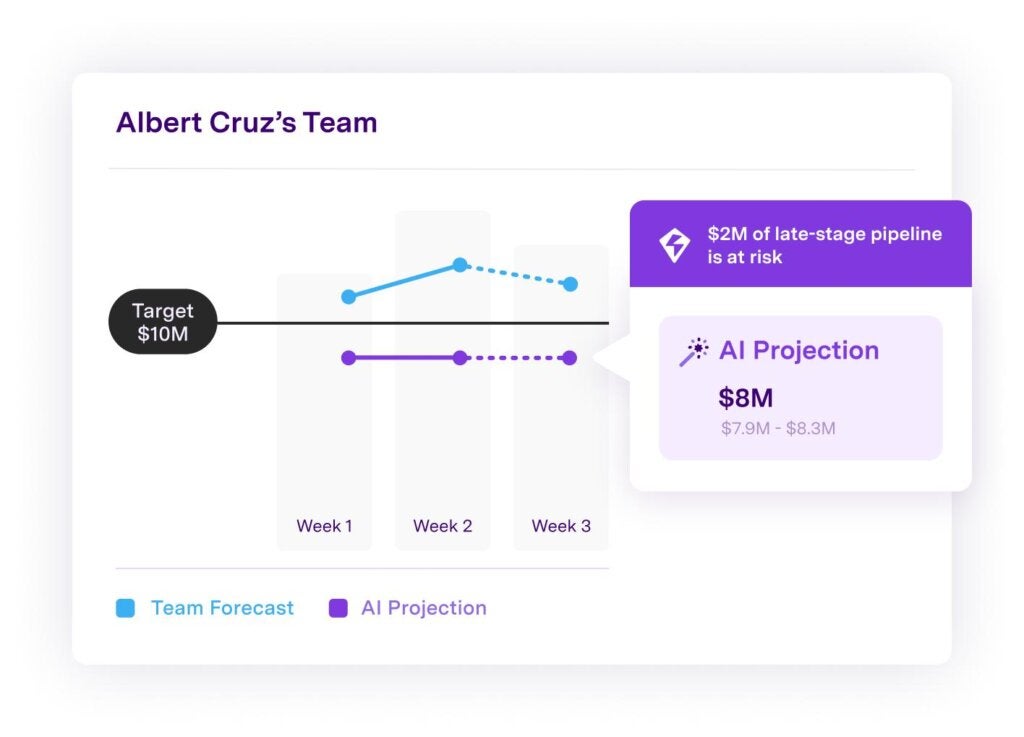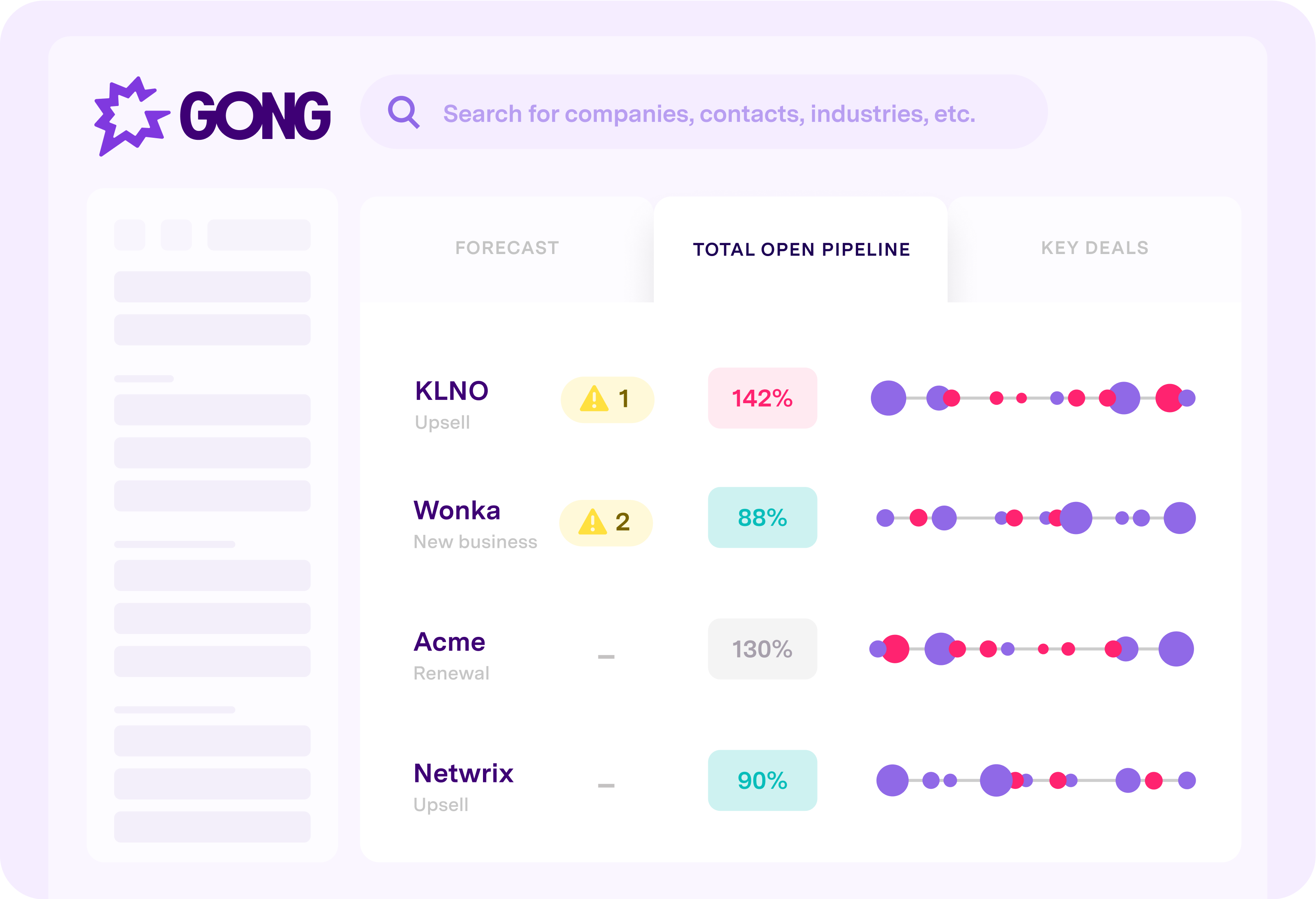Accurate sales forecasting: How we get there using Gong at Gong

If you also work in revenue operations, you know the relentless pursuit of accurate sales forecasting. Every company strives for that sweet spot, where precise forecasts drive impactful results and growth.
At Gong, we’re no different. We constantly analyze our pipeline to align with our goals and navigate complex data to make informed decisions. And we rely on our own platform to solve these challenges.
That’s why, as part of our “Gong on Gong” blog series, I’m pulling back the curtain to take you through some of the Gong Forecast features I rely on daily to prevent forecasting gaps and misses and achieve greater accuracy.
But first, rhythm and rigor
Before I get into how I use Gong, I want to stress the importance of embedding forecasting as a critical part of your organization’s operating rhythm. We’ve set clear weekly steps and expectations for reps, managers, and VPs that keep our data accurate and actionable. It’s this rigor and discipline that allows us to maximize Gong’s capabilities in the first place. Adhering to clear processes and fostering accountability will keep you aligned with your business and hugely increase your win rates.
Pulse-checking pipeline
It can be tough to ensure clarity and alignment across your entire revenue team. I’m obsessive about monitoring Gong’s pipeline to foster collaboration and focus our efforts on the right activities. I do a deep dive every Monday but maintain real-time awareness by checking our pipeline build every single day.
Using Gong’s Deal Board functionality, I can quickly assess how much pipeline is being built across each channel and team. Inside of Gong Forecast, you’ll find that you can either use different deal board templates or build your own. We rely on specialized views of the pipeline generation board to focus on critical metrics, for example. I’m particularly interested in where our pipeline may be falling and how that impacts coverage in the current and upcoming quarter. Seeing gaps early helps us adjust strategies to mitigate risk and keep our momentum.
Managing risk: What I’m checking week to week
Missing a forecast is my biggest fear. You too? To make sure that doesn’t happen, I try to identify at-risk areas and find ways to mitigate them throughout the quarter. Every week, I look for potential gaps in our sales forecast and determine how we might fill them. When the indicators give us confidence, I may even raise our forecast, but then the cycle starts over to ensure we don’t miss the new target. To effectively manage these risk cycles, here are key things that I review all within Gong Forecast:
- Tracking to target attainment and forecast
- Stage progression
- Deal likelihood
| Tracking to target attainment and forecast | Gong Forecast makes it easy to see how each team’s roll-up is tracking to their quarterly target and forecast compared to Gong’s projection. Steps I take: 1. Scan the respective sales leader’s weekly notes directly within the dashboard for important context. These notes also help streamline our weekly forecast calls. 2. Confirm we have sufficient deals in the pipeline to cover each sales leader’s call. 3. Check Gong’s projection. If it’s higher than the particular sales team lead’s forecast, there’s potential upside and less risk. Sometimes this gives us the confidence to increase our forecast. |
| Stage progression | Stage progression is one of the first indicators I check for pipeline risk because it shows how close a deal is to closing. Steps I take: 1. “Show deals” for each sales team lead and filter for “open deals.” 2. Ensure a sufficient portion of their pipeline is in late stages. If it is, our risk is low. If too much of our pipeline is in early stages, I will: 1. Gather our VP of Revenue Operations, Head of Ops, and the relevant sales team lead to discuss any missing context and devise a game plan. 2. Identify “best case” deals that may be moved forward to reduce or remove risk. 3. Highlight any deals that might slip into the next quarter. 4. Consider lowering the forecast. 5. Make necessary adjustments for future quarters. |
| Deal likelihood | Gong’s deal likelihood scores indicate deal health, helping me understand how likely it is that deals will close relative to one another. The scores are based on customer conversations, deal activity, customer involvement, deal progression, and historical performance. They’re valuable for exposing risk and guiding our efforts to stay on target. Steps I take: 1. Filter to see how much of our total open pipeline, forecast, and best-case scenarios are categorized as low, fair, or high-likelihood to close. 2. Ensure key deals are not categorized as low-likelihood to close. 3. Confirm we have sufficient, fair, or high-likelihood pipeline to cover the risks posed by low-likelihood deals. 4. If we have a large volume of high-likelihood, best-case deals, it might be the bullish sign we need to increase our overall forecast, which we’ll discuss on our forecast call. 5. Review our tab of “swing deals” – the ones that will make or break our forecast. This is where we’ll spend a lot of time strategizing on our forecasting calls. 🌟Pro-tip: For each swing deal, we’ve highlighted the executive sponsorship strategy front and center within Gong, making it easy to rally everyone as needed. We also actively monitor competitor mentions within our must-win deals to stay in front of potential risks. |
Master sales forecasting with AI-powered precision
I always say forecasting isn’t about being right — it’s about managing how wrong you might be. That’s the beauty of it. You have to understand risk profiles and leverage the right solutions to navigate them effectively.
That’s where Gong Forecast comes in; it has taken our revenue operations to new heights. By centralizing everything within our platform, we’ve achieved incredible accountability and alignment across our teams. Gong Forecast’s latest enhancements have drastically increased our ability to forecast with accuracy and agility.
Gong Forecast can help you make AI-powered, informed decisions based on real customer interaction data. It offers a holistic view of your sales pipeline, and supports your entire revenue organization – from SDRs to AEs to customer success – to drive revenue growth and operational excellence.
If you’re ready for next-level revenue forecasting results, get in touch.

